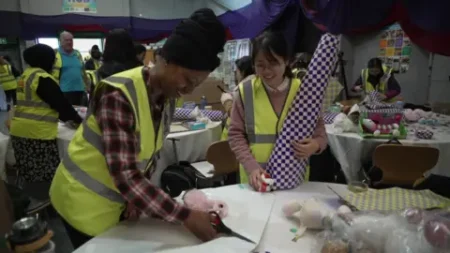The Trump administration is currently embroiled in a heated legal battle regarding its implementation of extensive tariffs, which were initially imposed using emergency powers. In light of a recent court ruling that challenged the validity of these tariffs, the administration has sought a temporary pause in the decision. This request was directed toward a U.S. appeals court, following a preliminary injunction that was granted just a week prior, which had significant implications for two American toy manufacturers.
The administration’s argument, presented to the appeals court, asserts that a halt in the enforcement of these tariffs could jeopardize ongoing trade negotiations with various countries. Furthermore, they emphasized that if these tariffs were undermined, it would diminish their effectiveness as a deterrent to unwanted trade practices. This legal maneuver highlights the administration’s urgency in maintaining its tariffs as part of its broader economic strategy.
On the other hand, the judicial decision that raised these legal questions was made by U.S. District Court Judge Rudolph Contreras. He specifically noted that the two family-owned toy companies, namely Learning Resources and hand2mind, would suffer irreparable harm if these tariffs were allowed to persist. In his ruling, Judge Contreras also pointed out the lack of specific legal authorization for such tariffs under the International Emergency Economic Powers Act (IEEPA), which was the legal basis employed by Trump for imposing a substantial portion of his tariffs. The administration was quick to appeal this ruling to the U.S. D.C. Circuit Court of Appeals, indicating that the legal battle over tariffs is far from over.
The tumult surrounding this case adds to a broader context of legal uncertainties regarding the Trump administration’s economic vision. While the immediate lawsuit specifically concerns the two aforementioned toy companies, it is crucial to note that a more extensive legal case is unfolding within the U.S. Court of International Trade. This might lead to far-reaching implications for the administration’s trade policies and, by extension, the global economy at large.
Significantly, a prior ruling from the niche trade court earlier this year reaffirmed that President Trump may have overstepped his grounds when implementing these broad tariffs under the IEEPA. This ruling effectively blocked his so-called “Liberation Day” tariffs, as well as other tariffs imposed earlier on products from countries such as China, Mexico, and Canada, which Trump justified as measures to combat the influx of fentanyl into the United States. Following this, the Trump administration appealed the ruling, and a federal appeals court quickly intervened, placing a pause on the earlier decision – thereby temporarily reinstating Trump’s capacity to impose tariffs.
In the midst of these legal developments, Judge Contreras granted a two-week stay on his ruling, which provides a window for the legal complexities to unfold. Nevertheless, he mandated that the two toy companies receive protections against tariffs, independent of the proceedings in the trade court. Richard Woldenberg, the CEO of Learning Resources, expressed his optimism about the favorable district court ruling during a conversation with CNN, affirming the company’s belief in the validity of the judge’s reasoning.
In its latest filing regarding the dispute involving the toy companies, the Trump administration contended that the district court does not possess the appropriate jurisdiction to address the matter, asserting instead that exclusive jurisdiction lies with the trade court. This back-and-forth exemplifies the ongoing tensions between judicial interpretations of trade law and the powers wielded by the executive branch.
In conclusion, the legal issues surrounding Trump’s tariffs serve as a focal point for broader discussions on international trade and executive authority. The cases involving Learning Resources and hand2mind represent localized disputes but could echo throughout the national and global economic landscape, impacting trade negotiations and the very structure of U.S. trade policy. The outcome remains uncertain, but the implications could be significant for trade relations, judiciary authority, and the overarching economic strategies employed by the administration.











